
In the flower garden for roses, one of the most malicious pests in the garden is a serious spider mite. He hides on the underside of the leaves and sucks out the cell sap from the plants. If the dirty man was just discovered, then you can get rid of it by resorting to folk remedies, many of which show their high effectiveness in combating many harmful insects.
Content
A few words about the pest
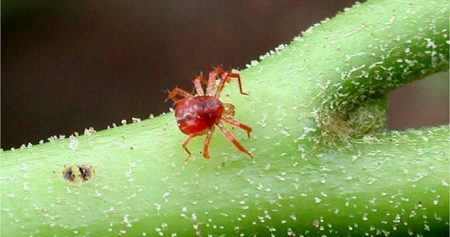
A spider mite is a small arachnid oval-shaped insect, 1 mm in size, red in color (the larvae are light green in color). Plant juice is the main food of the pest. The insect is omnivorous, it attacks absolutely all plants that come in the way. It can be transported over long distances using its web. At air temperatures above +23 degrees, the tick multiplies rapidly, laying on the leaves up to several hundred eggs. Larvae are particularly voracious - they drink vegetable juice. At the same time, the process of photosynthesis is disrupted, the plant is depleted and dies.
The spider mite most often affects young bushes that do not have strong immunity. On such bushes, when exposed to a pest, buds do not have time to form.
Causes of infection
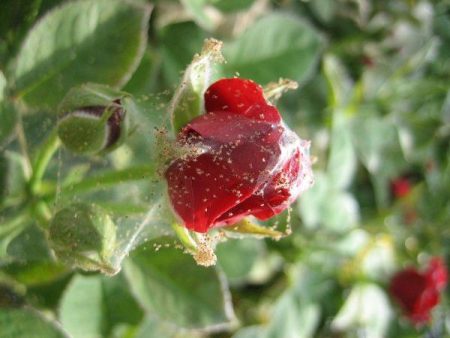
If the tick has already reached your garden, then after a couple of weeks its numerous offspring will “rule” the entire flora growing on the site. He does not pass by neither vegetable crops, nor fruit trees, nor flowers. The pest spreads by air, that is, it is carried by wind from plant to plant. Pets can also “help” the parasite (bring on wool). Typically, territory is captured in hot, dry weather when dusty conditions are created. First, the tick falls on plants growing on the outskirts of the site, and then, with each new stream of wind, it moves into the garden.
Most often, those roses that do not receive proper care from a person are affected by a tick. Without regular top dressing, tillage, pruning, plant immunity is weakened - such flowers cannot resist the onslaught of the enemy. The situation is aggravated if the plantings are very thickened and overgrowth grows in them.
Illiterate rose care is the cause of the spider mite. With insufficient watering and thickened planting, roses have little chance of survival.
Signs and how to recognize a tick on roses
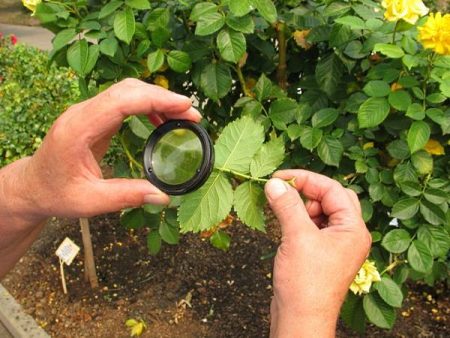
This insect is so small that it can be very difficult to recognize it on the lace leaves of rose bushes. This can only be done with a magnifier. It is possible to detect a tick with the naked eye when it grows in size, but most often at this stage it is not possible to save the flowers. The tick prefers to live and breed on the underside of the leaf. The tick-borne family is growing very fast - the number of colonies can reach several hundred gluttonous individuals.
Places of parasitic exposure of the tick are covered with white spots - it is their presence that should alert and suggest the defeat of the rose by the tick. Over time, these spots grow, and the axils of the leaves become entangled with a thin whitish web. Affected leaves turn yellow, dry and then fall off.If no action is taken, the web can completely envelop the bush, including buds that are mummified and then fall off. With a multiple increase, the population looks like a large, swarming mass of red. In this case, the plant can completely lose leaves and flowers, and the stem is covered with a strong thread of cobwebs. Such a bush will have to be dug up and destroyed.
Indoor roses are especially susceptible to tick attack.
Save the roses from the tick
It is very difficult to fight the tick in the summer, because on sunny hot days it is especially active and strong. However, sudden cooling and precipitation can significantly reduce the number of pests on roses. Partially exterminate the tick will also help birds who love to feast on small insects. But all these factors will not completely eliminate the problem, but only temporarily delay the growth of the colony.
To reduce the "concentration" of the tick on plants, severely damaged areas will have to be removed. Next, unfavorable conditions for the pest should be created - the bushes need to be poured with water by sprinkling (so most ticks are washed off with a stream of water). Then thoroughly shed the warm water under the bushes.
If the tick has not yet managed to greatly increase its population, then you can save the flowers with "little blood", that is, using folk methods. The most popular natural “pills” include:
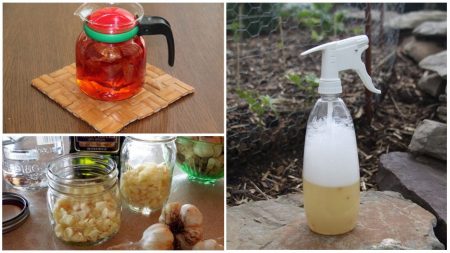
Soap solution
Garden roses will require a concentrated soap solution. In a bucket of water, 200 grams of laundry soap are carefully bred. The resulting mixture is insisted for a couple of hours and only then the flowers are sprayed with it.
Instead of soap, you can use a liquid dishwashing liquid.
Processing should include spraying all parts of the bush. You can also spray the ground at the base of the stem, but you need to do this very carefully, without touching the solution with the roots, otherwise you can destroy the bush.
After 3-4 hours, the soap film is washed off with water and the plant is covered with polyethylene for 24 hours, creating high humidity (which the tick does not tolerate).
It is believed that green soap does a good job of killing ticks. By the way, its purpose is to exterminate insects. However, its effectiveness is in doubt among gardeners. Many of them claim that it can be used only as a preventative measure.
Alcohol solution
To prepare an alcohol solution, 30 grams of ammonia and 10 liters of water are required. By mixing, we get a substrate that needs to be wiped off all damaged organs of the plant.
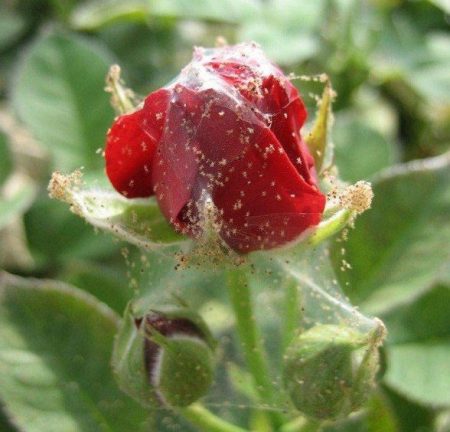
You can prepare the medicine in another way: add grated soap to boiling water and pour a glass of ammonia into the mixture. Plants are treated with a solution cooled down to room temperature. You do not need to spray the solution on the flowers, optimally apply the concentrate on a cotton pad and wipe the leaves and stems that are most affected by the tick. In addition to the bushes, you can also wet the topsoil.
Garlic tincture
There are several recipes for a healthy decoction:
- finely chop the head of garlic, dilute it in hot water (10 liters), cool and process the plants;
- 50 grams of grated garlic is added to a three-liter jar of water and put in a dark place for a week. After this time, the infusion is filtered, 60 grams of the concentrate are separated and diluted with 10 liters of water. Then carry out the processing;
- chopped garlic is diluted in cold water and the whole flower bed is sprayed with the resulting mixture. The best effect will be if you add soap to the solution.
Onion husk broth
200 grams of onion husks are poured with 10 liters of water and left to infuse for 10-12 hours. The finished infusion is filtered and sprayed over the roses.
If there are not many roses on the site, then you can simply wipe the leaves with one of the above tools. The procedure must be repeated once every 7 days throughout the summer.
Tobacco infusion
The tick does not tolerate the smell of tobacco and quickly retreats from plants if you spray them with a solution prepared on the basis of tobacco. The recipe for a useful tincture is as follows: 50 grams of dry tobacco powder is mixed with water and left for a day. Then the mixture is filtered and diluted with water again. The finished product is carried out two or three times spraying every 7-10 days.
Rosemary Essential Oil
For the extermination of small individuals, an easy-to-prepare essential oil-based product that the tick does not tolerate is suitable. 8-10 drops of rosemary are added to a liter of water, mix well and rub the leaves of roses abundantly with the finished solution.
Herbal infusions and decoctions
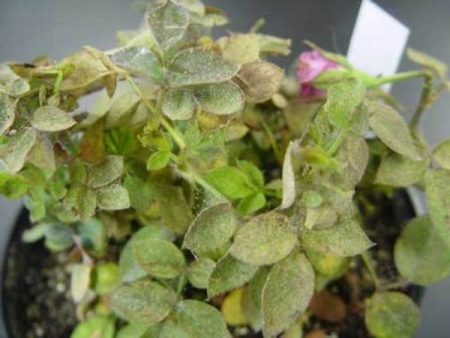
Decoction of tops. Potato and tomato tops also do a good job of exterminating the pest. To prepare the broth, finely chop the tops (400 grams), pour boiling water over it, boil over the fire for 30 minutes. Before spraying, the mixture is cooled, filtered and diluted with water in a ratio of 1: 3. Such a tool will not harm the flowers, even if you use it repeatedly throughout the growing season.
Infusion of dandelion. Among the most unpleasant odors, the tick also includes a dandelion, which is in the hands of the gardener. Roses are sprayed with a mixture of 40 grams of medicinal dandelion and 1-2 liters of water. By the way, before the procedure, the solution should be infused for 5-6 hours.
A decoction of cyclamen. A useful decoction is prepared from 50 grams of the roots of the flower. The roots are cleaned and then boiled in a small amount of water for an hour. Then the solution of the substrate is filtered, and the resulting muddy water is rubbed on the leaves and stems that have received the most severe damage. The procedure can be repeated 2-3 times with an interval of five days.
Yarrow infusion. It is necessary to take a kilogram of dry leaves of a medicinal plant, pour boiling water and let it brew for 3-4 days. The infusion should receive a light yellow color with a tart odor inherent in the yarrow. Ready infusion process roses every 7 days.
Infusion of bleached. A poisonous plant like no other is suitable for the destruction of a malicious pest. To prepare a saving infusion, you need 1 kilogram of bleached, which is poured with water and left to infuse for about 10 hours. Then the infusion is filtered, grated soap is added. The resulting concentrate is diluted with 10 liters of water and only then the bushes are treated.
Infusion of horseradish. The roots are finely chopped (one kilogram is enough), poured with cold water in a ratio of 1:10, insisted for several hours and water the plants.
Decoction of alder leaves. Fresh cold leaves of gray alder (2 kilograms) are poured into cold water and left to brew for a day. Then the substrate is boiled over low heat, cooled and insisted again for 12 hours. The resulting mixture is filtered and shed soil in the flower garden.
A decoction of wormwood. Dry branches of wormwood are placed in a bucket of water and left to soak for two days. Then the compost is cooked for 30 minutes, filtered. Before the spraying procedure, the mixture is diluted with 10 liters of water.
Additional tick control measures
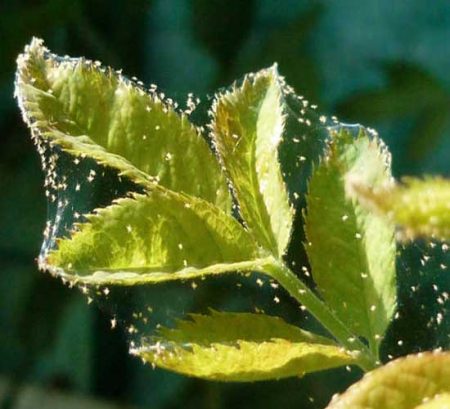
In parallel with useful spraying, it is necessary to carry out additional manipulations that can significantly reduce the enemy's army.
Tick extermination tips:
- The best time to combat the spider mite is autumn, when weather conditions unfavorable for the pest come. It is necessary to collect all the tops, weeds and the remains of plants from the site - it is in them that the tick hides. All grass needs to be burned outside the garden.
- afraid of tick excessive moisture. If he settled on roses, then you should often and abundantly water the roses.
Do not get carried away in this way, because an excess of moisture can cause a fungal infection.
- flies and spiders do not disdain to dine with a tick, so these insects must be given a "green" light if they surrounded the flower garden. When examining the bushes, it is necessary to determine exactly which insect the web belongs to - maybe an ordinary spider has twisted it.
- It is unreasonable to spray roses with phosphates, since the proportion of nitrogen on the leaves increases, and this favorably affects the increase in tick-borne colony.
- Before using chemistry, you must first spray the bushes with a soap solution. The film will not let the insects run away, and they will soon die from a lack of oxygen.
- if folk remedies do not help, then it is worth giving preference to biological agents, such as Fitoverm. This drug can be used to treat roses several times a season.
If the roses are not very affected, then 2-3 therapeutic sprays will be enough. Launched plants will have to be treated throughout the growing season.
Prevention

There are several recommendations on how to prevent the defeat of roses by a tick. Basic rules include:
- regular inspection of bushes, special attention must be paid to "secret" places (the lower side of the leaves);
- if a web is found, make sure that it belongs to the tick. Its web has a very small pattern, its color is yellowish with a whitish bloom. Under it, you can see hundreds of moving particles - these are the pest larvae that have been born;
- frequent spraying of plants with cool water during hot, clear weather;
- rubbing the leaves once a month with a grass-based solution or a soap solution. By the way, they need to process not only plants, but also pots, shelves, windowsill, frames;
- timely removal of faded buds and yellowed leaves - it is the weakened parts of the plants that attract the pest;
- conducting spring sanitary pruning of roses and breaking of wild growth. Landings should be sparse;
- spider mite adores orchids. Therefore, in order to protect roses from getting an insect on them, they should be protected from such an unfavorable neighborhood;
- planting next to roses useful plants that produce insect repellent substances (calendula, marigolds, chamomile, onions, nightshade)
Pest resistant varieties

Many modern hybrids are able to hold the defenses against the invasion of the pest. Such varieties have good immunity, they are resistant to adverse weather conditions. For healthy and strong plants, the mite can be difficult to approach.
Popular varieties:
- hybrid tea - Sophia Loren, Gloria Day, Erotica, Renaissance series, Landora, Mainzer Fastnacht;
- floribunda - Allotria, Bonica, La Sevillana;
- climbing roses - Flamendand, Gold Stern, Golden Showers.
But even resistant varieties of roses without additional help will not be able to withstand the invasion of the spider mite. Therefore, any plant must be grown with special attention and care.
Conclusion
In the fight against spider mites, you should not immediately resort to chemistry, because with such aggressive compounds you can harm your favorite flowers. If the number of spider mites has reached a catastrophic mark, then it will be most rational to apply traditional methods of pest control. Proven by experience and time, many of them have already proven their effectiveness. Moreover, treating your roses with natural infusions or decoctions, you will never harm the plants, but only strengthen them, increase immunity and permanently get rid of not only ticks, but also other harmful animals.

 Shelter of roses for the winter: at what temperature does the robot hold
Shelter of roses for the winter: at what temperature does the robot hold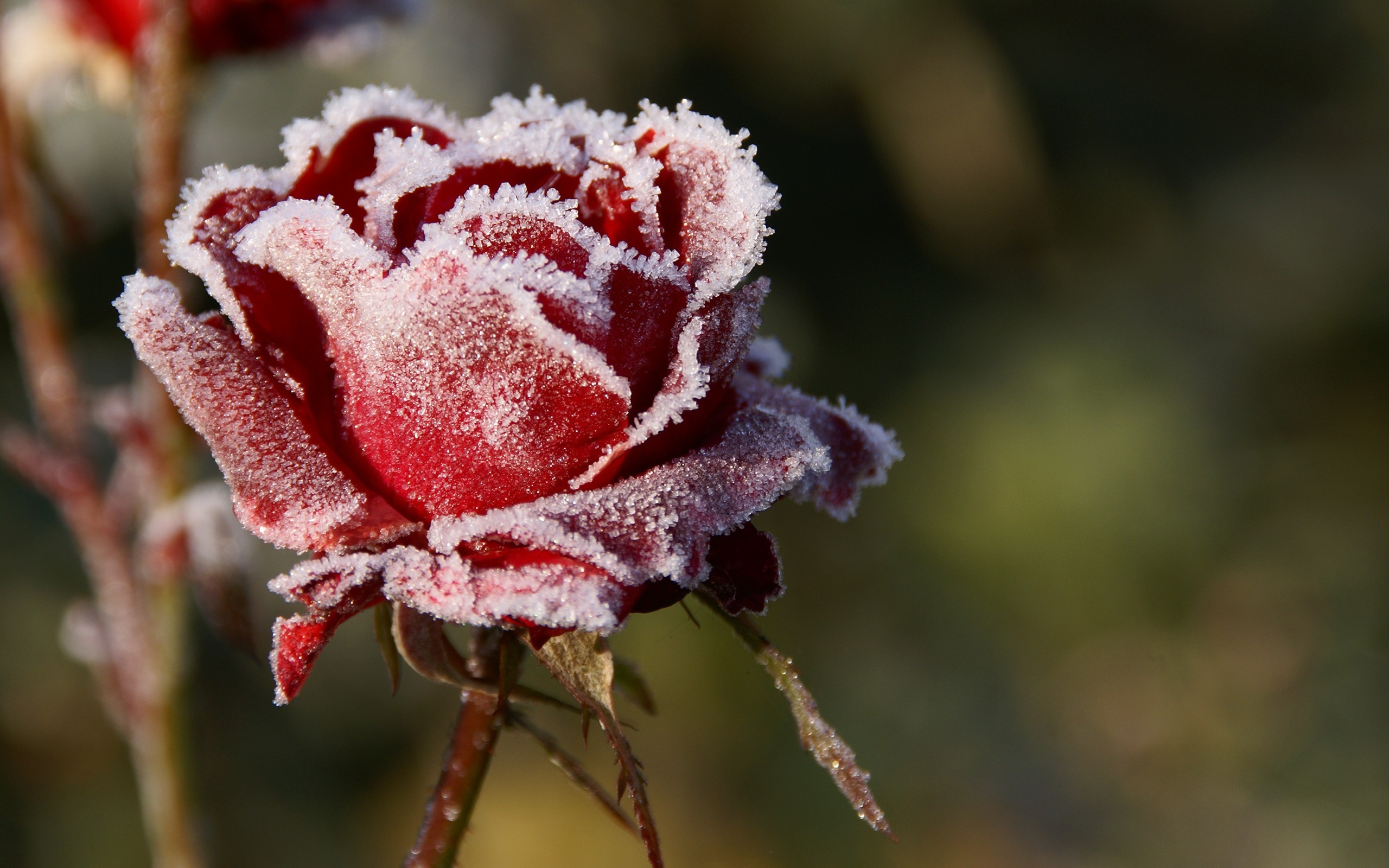 How to prune roses in the fall: timing, pruning rules, pros and cons
How to prune roses in the fall: timing, pruning rules, pros and cons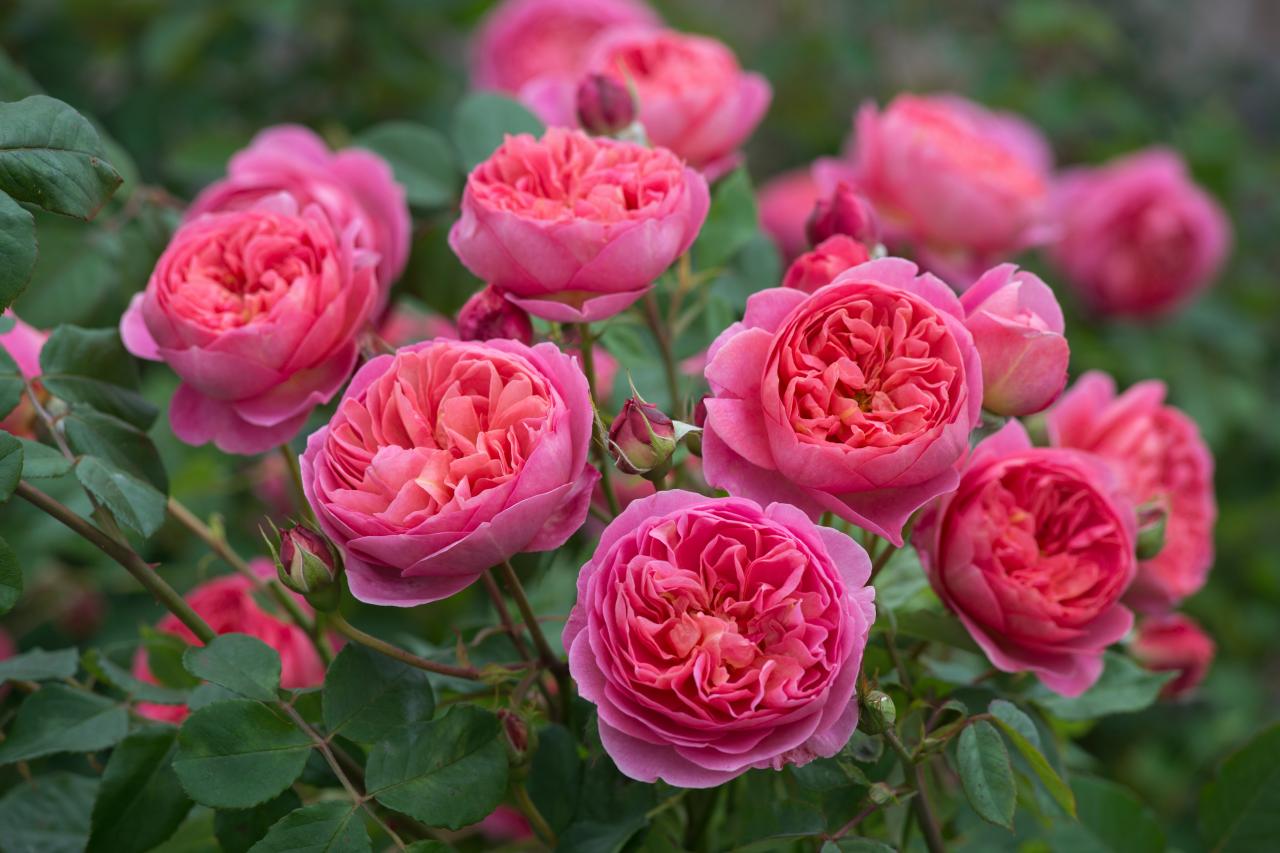 What are the varieties and types of roses
What are the varieties and types of roses How to process roses with iron sulfate in autumn: proportions, advantages and disadvantages
How to process roses with iron sulfate in autumn: proportions, advantages and disadvantages